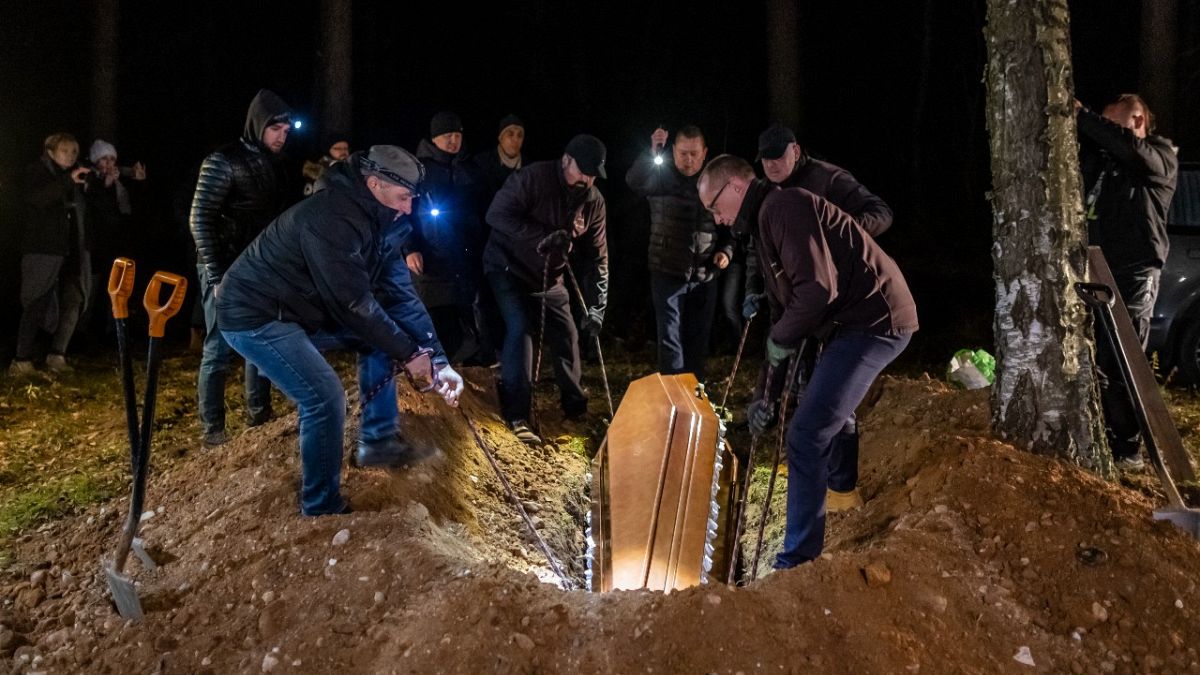A Syrian teenager who died trying to cross the frontier was buried in Poland on Monday, while the bodies of two Iraqi men were flown home.
The body of a young Syrian migrant who drowned while trying to cross a river on the Belarus-Poland border was buried on Monday.
The burial of Ahmad Al Hasan, 19, took place in a cemetery run by Poland's tiny Muslim community, in the presence of a handful of witnesses. It followed a prayer in a wooden mosque in the village of Bohoniki.
Ahmad's family were able to take part remotely, via the phone of a Syrian doctor who has lived in the region for years.
The teenager had hoped to continue studies he had begun in a refugee centre in Jordan, said Kasim Shady, speaking on behalf of his family from Homs, devastated by Syria's decade-long war.
The leader of the local Muslim community, Maciej Szczesnowicz, said that Ahmad Al Hasan was "a human being... a Muslim, a youth" for whom it was essential to "give a burial worthy of the name".
Szczesnowicz said the teenager — one of 11 migrants to have died since the beginning of the crisis — died as he tried to cross the Bug, the river running along the border between Poland and Belarus.
Thousands of kilometres away, the body of another young man who died at the border arrived at Irbil airport in his native Iraq early on Monday.
Gaylan Delir Ismael, a 25-year-old from the Kurdistan region, had been trying to reach Germany in the hope of starting a new life and receiving treatment for his chronic illnesses. He jumped at the chance when he heard other Iraqis were making their way to Europe via an easily obtained tourist visa from Belarus.
He too died in a dark and soggy forest near the Belarus-Poland border. The circumstances of the confrontation at the border that led to Gaylan's death, which happened before the recent build-up of Polish troops, are unclear.
Gaylan's coffin was carried away, along with that of another Iraqi on the same flight. Kurdo Khalid's family say he died on October 31 of a brain haemorrhage at the border.
“It is really a sad tragedy. I urge the youths here not to migrate from Kurdistan,” said Bilal Khalid who received his brother’s body at the airport.
Migrants clash with Polish border guards
Polish border forces said on Tuesday that they were attacked with stones by migrants at the Belarusian border and responded by using a water cannon against them.
The Border Guard agency posted video on Twitter showing a water cannon being directed across the border at a group of migrants in a makeshift camp.
Polish police said one officer was seriously injured. He was taken by ambulance to a hospital and it is likely his skull was fractured after being hit by an object.
The situation marks an escalation in a tense migration and political border crisis where the lives of thousands of migrants are at stake.
Poland's Defence Ministry said its soldiers and other border forces were attacked with stones and other objects.
The ministry also said that Belarusian forces tried to destroy fencing along the countries' common border, while the Interior Ministry posted a video apparently showing migrants trying to tear down a fence.
Russian Foreign Minister Sergey Lavrov on Tuesday called the actions of Polish forces “absolutely unacceptable.” Lavrov charged that Polish forces “violate all conceivable norms of international humanitarian law and other agreements of the international community.”
Polish officials have often said that Russia bears some responsibility for the crisis at the border given Moscow’s alliance with Belarus. The Russian government has denied responsibility.
There was no way to independently verify what was happening because a state of emergency in Poland is keeping reporters and human rights workers out of the border area.
In Belarus, journalists face severe restrictions on their ability to report as well, with only a few present at the border.
EU calls for humanitarian aid and extends sanctions
On Monday large groups of migrants sat behind wired fences on the Belarusian side of the border with Poland as a tense migration standoff between Warsaw, Minsk and the European Union continued.
The EU is calling for humanitarian aid as up to 4,000 men, women and children are stuck in makeshift camps in freezing weather in Belarus while Poland has reinforced its border with 15,000 soldiers, in addition to border guards and police.
Meanwhile, Lithuanian officials said they were seeing a rising number of attempts by migrants to cross its border from Belarus.
EU foreign ministers have extended the scope of sanctions against the regime in Belarus to add airlines, travel agents and others accused of helping to bring migrants to Minsk.
Brussels says the country's disputed president Alexander Lukashenko has for months invited migrants to the Belarusian capital of Minsk, many of them Iraqis, Afghanis and Syrians, with the promise of helping them across the border.
Merkel's call with Lukashenko
Lukashenko spoke on the phone with German Chancellor Angela Merkel on Monday, the first such call between the Belarusian autocrat and an EU leader since the brutal repression that met mass protests in the wake of the 2020 presidential election, all but universally seen as rigged.
The two leaders spoke "in particular of the need for humanitarian aid for the refugees and migrants" at the border, said Merkel's spokesman Steffen Seibert. They agreed to continue discussing the problem, he added.
The Belarusian state news agency Belta said the call lasted 50 minutes, without giving further details.
